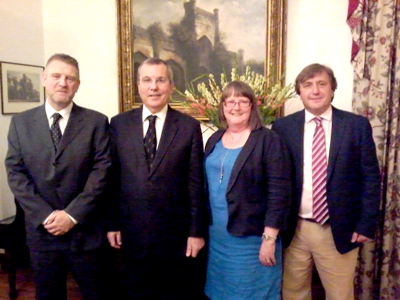Doon Launches Teacher Training
Doon launches teacher training programme in India with IOE at the British High Commission

On 9th September 2014, Sir James Bevan, the British High Commissioner, welcomed distinguished guests from the top schools and colleges around India to celebrate and consolidate the partnership between The Doon School and the Institute of Education, University of London at The British Embassy in New Delhi. The Doon School has embarked on a unique international teacher education program offered by the Institute of Education, University of London. The strong connection with the UK has made the collaboration with the IOE an obvious one, and both institutions have a clear mission and identity rooted in best educational practice and values the research and evidence that supports and enhances that practice.
Speaking at the event, Sir James Bevan said ‘I am delighted to be hosting this event to celebrate the collaboration between what is widely regarded as the best boys’ school in India – the Doon School – and the world’s top education research center – the Institute of Education at the University of London.
There are several reasons why I am personally happy to be hosting this event. First, because teaching is special to me: I married a teacher, and before I became a diplomat I was a teacher myself. I was not a very good teacher, so it is very much to the benefit of students everywhere that I became a diplomat. But those few years teaching showed me both how tough it is to be a good teacher, and how rewarding it can be.
The second reason I’m delighted to be your host is because I know the Doon School well: Janet and I have had the pleasure of staying there, and I oversaw the visit there late last year of a much more important person than me, namely HRH the Duchess of Cornwall as part of her India tour with HRH Prince Charles. I know that HRH was hugely impressed by what she saw.
And the third reason is this: that of all the areas in which India and the UK are building partnership, education is in my view the most important of all, because of the deep bonds it builds between our peoples; because of the understanding of each other’s countries which it ensures; and because of the knowledge, prosperity and success it generates for both our countries.
I am delighted to see so many other guests here from some of the other first class educational institutions in India and the UK. We should celebrate their contributions and their partnerships too.
In this job I see a lot of universities, schools and colleges, and I know that there is often friendly rivalry between them. Perhaps the biggest rivalry in the UK is between our two oldest universities, Oxford and Cambridge – which I know several of you distinguished guests here this evening attended.
So I thought I would leave you with this story. A philosopher from Oxford and a scientist from Cambridge are being chased through the jungle by a hungry lion. As they are running, the Cambridge scientist takes out his notebook, makes some quick calculations, and says “there’s no point in us trying to outrun it, it’s going to catch us”. And the Oxford philosopher replies: “That’s OK. I’m not trying to run faster than the lion. I’m just trying to run faster than you”.
The Doon School is the first school outside of the UK to embark upon a whole school teacher training program in this way. Four years ago, the first cohort of teachers began the two year postgraduate course to Master’s level. The school’s commitment to India, through its mission which began in 1935, has not wained and the decision to invest in all of the teaching staff is a power indication of the reaffirming of that commitment. All members of the school’s teaching staff are expected to complete the iPGCE, a bespoke program built around the developmental needs of the school, but based on the London-based teacher education program currently offered at the IOE. It involves input and assessment by academic staff from the IOE at the school through regular school visits and work with teachers on aspects of their personal pedagogical practice supported by the study and application of best practice and relevant research into learning and teaching. As a consequence the iPGCE features a strong practitioner enquiry element and is underpinned in its design by the best available evidence on teaching and learning.
By January 2015, nearly half of the teaching staff at The Doon School will be registered on this two-year part-time professional development program and through the partnership with the Institute of Education faculty, The Doon School will have the opportunity to continue on to Master’s and Doctoral programs.

 ANNOUNCEMENT
ANNOUNCEMENT
